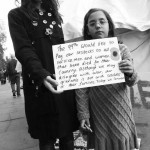 That because no demands are being made, the movement is pointless
That because no demands are being made, the movement is pointless
This is a common accusation. Traditionally, a protest movement will begin with a list of demands for changes they wish to see. Occupy is intentionally different. It came about because of a shared idea that the economic and political structures and systems aren’t working for the majority of people, but that debate on the issue had been stifled by those at the top so they could impose solutions that served their own interests. To tackle these issues a fresh perspective is required, and it needs to happen outside of the tired, corrupted democratic model that has let so many people down. Simply by Occupy’s existence these debates are taking place, and as public awareness and education into these issues is raised demands will flow from that. These things aren’t going to happen overnight, and those who use this as a stick to beat Occupy with are missing the point, perhaps intentionally.
That because millions haven’t taken to the streets, Occupy isn’t working
People don’t have to camp outside St Pauls, or in Finsbury Square, or in any of the thousands of camps that have sprung up around the world to show support for Occupy, nor do they have to pitch a tent to play a role in changing the world. What they need to do is to open their minds and listen to a greater diversity of debates and opinions than those that have been rammed down the public’s throats by the elites. From there they can make more informed decisions, and begin thinking of what changes they wish to see. Another way to help Occupy is to spread the word. People are interested, many don’t buy the arguments that have dominated the debate, and they want to hear more. People should counter false arguments when they hear them, such as when others blame the welfare state or government spending for the global banking crisis. There is evidence that this approach is working – opinion polls, media coverage, increasing demands by influential political, economic and social actors, the changing political discourse. Occupy needs to keep up the pressure to ensure these changes turn in to concrete action, and there may come a time people will need to take to the streets, but that time is not yet upon us.
That the camp would disrupt Remembrance Day commemorations
They didn’t. Many occupiers, including several veterans, took part in and respectfully observed all services. Protesters produced a lovely poppy tribute, and the two minutes silence was impeccably observed. Several hostile newspapers had reported that the camp had planned to disrupt the service, but this was merely mischievous journalism. The camp had worked with the cathedral to ensure all services ran smoothly, and that is exactly what happened
By David Robinson







